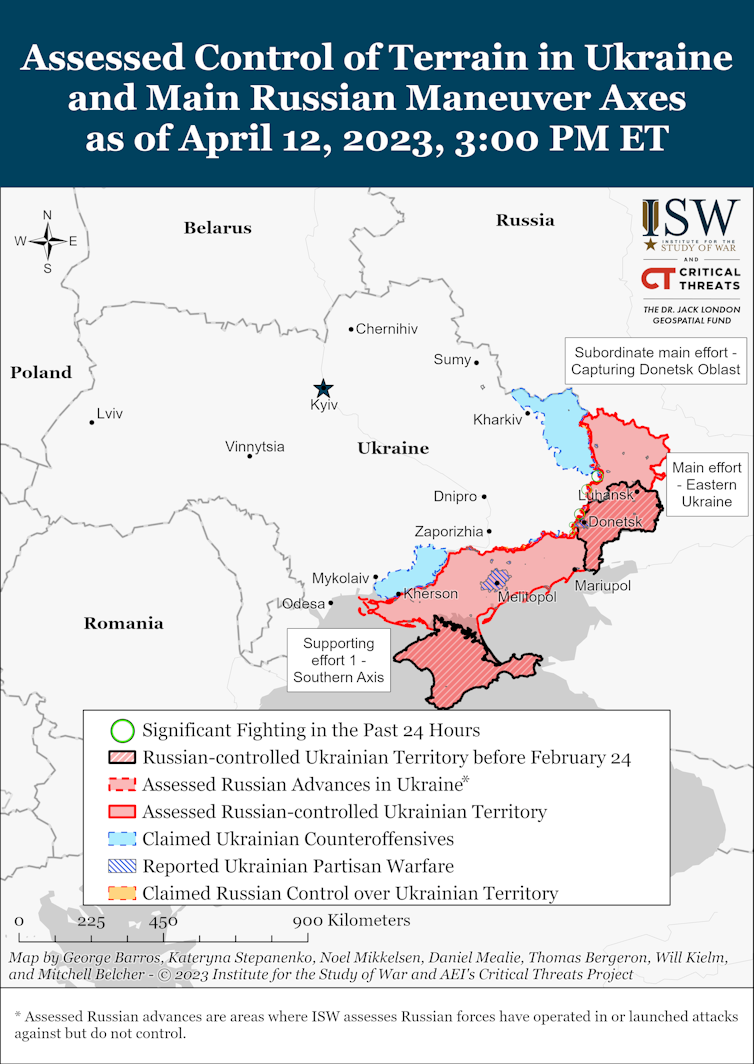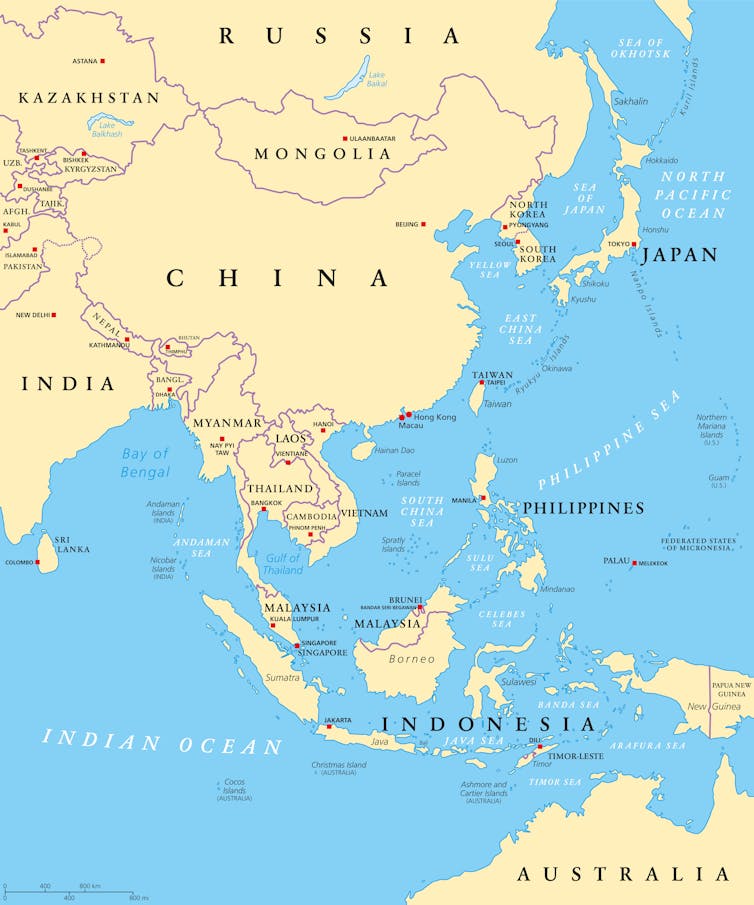What we know – or think we know – about the progress of the war in Ukraine over the past few days has come courtesy of leaked Pentagon documents which appear to cover, in some detail, a wide range of issues around the conflict. As you’d expect, among the main areas of discussion is the likelihood of a Ukrainian spring counter-offensive being launched sometime soon.
But there are also what appear to be revelations about the presence of British special forces in Ukraine and discussions of Russian infighting over the number of their casualties among other things.
As ever with leaked material, it’s important to add the caveat that, while the Pentagon has apparently confirmed that the documents appear genuine, any conclusions that are being reached by commentators must be read bearing in mind the maxim that “truth is the first casualty of war”.
But, if genuine, the Pentagon’s assessment of the much-anticipated counter-offensive is far from upbeat. Stefan Wolff, an international security expert at the University of Birmingham, notes an air of pessimism on the part of US intelligence that Ukraine’s spring push will yield any major breakthroughs.
The problem, writes Wolff, is a rapidly diminishing stockpile of arms. Ukraine remains heavily dependent on Soviet-era armour and artillery and is running short on ammunition (it should be noted here that the same can be said of Russia). The munitions promised by Ukraine’s allies in the west have been slow in arriving and the Ukrainian military has yet to be fully trained to use them.
Since neither side is backing down from its preferred outcomes from the conflict, it looks set to be a long war.
All of which inevitably means more tragedy for the people of Ukraine. As of March 20, according to the UN’s Office for the High Commissioner for Human Rights (OHCHR), the conflict has killed 8,317 civilians and injured a further 13,892 since the war began at the end of February last year.
A particular disgrace is the report, from the World Health Organization, that it had recorded more than 850 attacks on healthcare facilities in Ukraine. One such attack was on Maternity Hospital 3 in Mariupol during the siege of that port city in the Donetsk region last March. Three people were killed, including a small child.
Rodwan Abouharb, an expert in international relations at UCL, has published research on the effects of war on the infant mortality rate (IMR) and found that while wars push up IMRs by more than 10%, the really insidious thing is that by destroying a country’s health infrastructure, an aggressor country ensures that people will continue to die unnecessarily for years after the fighting stops.
Here he tracks IMRs from wars as diverse as Iraq (where the first Gulf War pushed the IMR up by a grotesque 47.9% between 1990 and 1991) to the conflict in Nagorno-Karabakh between 1991 and 1994, where the IMR continued to rise until 1997. As he notes: “It’s hard to imagine war crimes more heinous than those committed against infant children who have not yet reached their first birthday.”

The state of the conflict as of April 12 2023 according to the Institute for the Study of War. Institute for the Study of War
To attack a country’s infants is to steal its future. But there is also evidence that Russia has literally been stealing Ukrainian children. According to the Ukrainian government, 19,384 children have been deported to Russia since the start of the war. As covered in previous reports here, arrest warrants have been issued for both the Russian president, Vladkmir Putin, and his children’s commissioner, Maria Lvova-Belova.
Finding those children and reuniting them with their families will be a daunting challenge. Francesca Lessa of the University of Oxford and Svitlana Chernykh of the Australian National University have researched the history of child kidnappings during dictatorships and offer a case study from Argentina in the 1970s. During this period child kidnappings were a deliberate policy to remove children from activist parents and bring them up with a different ideological slant. Compounding the problem of identifying the stolen children was the fact that the regime had murdered many of their parents.
Geopolitics
It was difficult not to appreciate the irony of Finland’s decision to join Nato on April 4. One of the most oft-repeated justifications for Putin’s aggression against Ukraine was his fear that Nato was deliberately provoking Moscow by expanding eastwards since the breakup of the Soviet Union. But the addition of Finland as Nato’s 31st member effectively doubles the alliance’s land border with Russia.
Simon Smith, an expert in international relations and security at Staffordshire University, traces Helsinki’s changing security stance since the days when “Finlandisation” was used by scholars to describe any country that was forced to endure the interference of a bigger neighbour (as the Soviet Union had interfered by forcing Finnish neutrality). Finland’s accession also adds a country with an already robust defence policy and a well-funded military to the alliance. It’s hard not to see its decision to join as something of an own goal for Putin.
But if Finland (and possibly soon, Sweden as well) have joined Nato, swelling the ranks of countries that are in direct opposition to Russian aggression, they aren’t necessarily on the same page as the rest of the world. Russia may have the direct support of very few countries (only seven voted with Russia in February against a UN resolution calling for an end to the fighting), but – as Jose Caballero at the International Institute for Management Development (IMD) notes – Moscow appears to have the tacit support of a growing number of countries.
This trend, writes Caballero, is particularly marked in Africa, Latin America and Asia – where, of course, China’s Xi Jinping has declared his country’s “limitless” friendship for Russia.
Spare a thought for Mongolia, sitting landlocked between Russia and China. Just recently the country’s prime minister, Luvsannamsrain Oyun-Erdene, voiced his fears that the world would yet again sink into a polarised world order – a new cold war. Mongolia’s geography means it is heavily dependent on both Russia, from which it gets most of its energy, and China, which is its main export market.
Landlocked: Mongolia is squeezed between Russia to the north and China to the south. Peter Hermes Furian via Shutterstock
But, as the University of Bradford’s international security expert Christoph Bluth writes, since independence it has pursued a multipolar foreign policy, looking for economic, cultural and political partnerships wherever they are available. A new cold war, said Oyun-Erdene, would be “like a divorce … When the parents divorce, the children are the ones who get hurt the most.”
Narratives (and the fate of those who tell them)
Given that Putin has always insisted that Russia and Ukraine are essentially the same country, it’s fascinating to read this piece about the differing bedtime stories told to the children in the two countries. Sophia Moskalenko, who is an expert on the psychology of fairy tales and Mia Bloom, who studies children’s mobilisation into violent extremism – both of them at Georgia State University – acknowledge the power of folklore in shaping the worldview of children and, ultimately, of the adults they grow up to be.
Traditional Ukrainian bedtime stories tend to favour the underdog fighting and prevailing against the odds: typical Ukrainian protagonists start out as unlikely heroes, but their courage, cleverness and grit help them succeed against the odds (remind you of anyone?) Many Russian tales, meanwhile, feature a character known as “Ivan the Stupid”. Ivan – portrayed as a good-hearted but simple fellow, tends to prevail through no particular virtue of his own, but generally through the intervention of a magical character, the moral being trust to luck and everything will come out well in the end.
Something most Russian children seem unlikely to be hearing, at least from their political leadership, is the truth. And its depressing to report that one US journalist who was in Russia trying to get at the truth, has been detained and faces charges of espionage. Evan Gershkovich, a reporter with the Wall Street Journal, faces a 20-year prison sentence if convicted.
Tim Luckhurst, a former BBC correspondent who now researches the history of journalism at Durham University, writes that Gershkovich is just the latest in a depressingly long list of reporters who have faced jail – or worse – for simply doing their job too well.



 Trump’s Inflation Claims Clash With Voters’ Cost-of-Living Reality
Trump’s Inflation Claims Clash With Voters’ Cost-of-Living Reality  U.S. Announces Additional $6 Million in Humanitarian Aid to Cuba Amid Oil Sanctions and Fuel Shortages
U.S. Announces Additional $6 Million in Humanitarian Aid to Cuba Amid Oil Sanctions and Fuel Shortages  India–U.S. Interim Trade Pact Cuts Auto Tariffs but Leaves Tesla Out
India–U.S. Interim Trade Pact Cuts Auto Tariffs but Leaves Tesla Out  South Korea Assures U.S. on Trade Deal Commitments Amid Tariff Concerns
South Korea Assures U.S. on Trade Deal Commitments Amid Tariff Concerns  Norway Opens Corruption Probe Into Former PM and Nobel Committee Chair Thorbjoern Jagland Over Epstein Links
Norway Opens Corruption Probe Into Former PM and Nobel Committee Chair Thorbjoern Jagland Over Epstein Links  Netanyahu to Meet Trump in Washington as Iran Nuclear Talks Intensify
Netanyahu to Meet Trump in Washington as Iran Nuclear Talks Intensify  Ohio Man Indicted for Alleged Threat Against Vice President JD Vance, Faces Additional Federal Charges
Ohio Man Indicted for Alleged Threat Against Vice President JD Vance, Faces Additional Federal Charges  U.S.-India Trade Framework Signals Major Shift in Tariffs, Energy, and Supply Chains
U.S.-India Trade Framework Signals Major Shift in Tariffs, Energy, and Supply Chains  Trump Signs “America First Arms Transfer Strategy” to Prioritize U.S. Weapons Sales
Trump Signs “America First Arms Transfer Strategy” to Prioritize U.S. Weapons Sales  Trump Endorses Japan’s Sanae Takaichi Ahead of Crucial Election Amid Market and China Tensions
Trump Endorses Japan’s Sanae Takaichi Ahead of Crucial Election Amid Market and China Tensions  Trump Signs Executive Order Threatening 25% Tariffs on Countries Trading With Iran
Trump Signs Executive Order Threatening 25% Tariffs on Countries Trading With Iran  Japan Election 2026: Sanae Takaichi Poised for Landslide Win Despite Record Snowfall
Japan Election 2026: Sanae Takaichi Poised for Landslide Win Despite Record Snowfall  Missouri Judge Dismisses Lawsuit Challenging Starbucks’ Diversity and Inclusion Policies
Missouri Judge Dismisses Lawsuit Challenging Starbucks’ Diversity and Inclusion Policies  TrumpRx.gov Highlights GLP-1 Drug Discounts but Offers Limited Savings for Most Americans
TrumpRx.gov Highlights GLP-1 Drug Discounts but Offers Limited Savings for Most Americans  Federal Judge Restores Funding for Gateway Rail Tunnel Project
Federal Judge Restores Funding for Gateway Rail Tunnel Project  TrumpRx Website Launches to Offer Discounted Prescription Drugs for Cash-Paying Americans
TrumpRx Website Launches to Offer Discounted Prescription Drugs for Cash-Paying Americans  Pentagon Ends Military Education Programs With Harvard University
Pentagon Ends Military Education Programs With Harvard University 

































